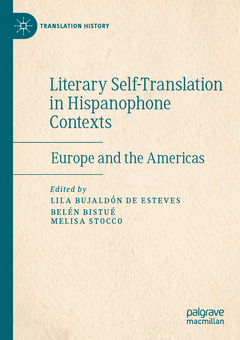Literary Self-Translation in Hispanophone Contexts - La autotraducción literaria en contextos de habla hispana, 1st ed. 2019 Europe and the Americas - Europa y América Translation History Series
Coordonnateurs : Bujaldón de Esteves Lila, Bistué Belén, Stocco Melisa

This edited book contributes to the growing field of self-translation studies by exploring the diversity of roles the practice has in Spanish-speaking contexts of production on both sides of the Atlantic. Part I surveys the presence of self-translation in contemporary Indigenous literatures in Spanish America, with a focus on Mexico and the Mapuche poetry of Chile and Argentina. Part II proposes to incorporate self-translation into the history of Spanish-American literatures- including its relation with colonial multilingual-translation practices, the transfers it allowed between the French and Spanish-American avant-gardes, and the insertion it offered for exiled Republicans in Mexico. Part III develops new reflections on the Iberian realm: on the choice between self and allograph translation Basque writers must face, a new category in Xosé Dasilva?s typology, based on the Galician context, and the need to expand the analysis of directionality in Catalan self-translations. This book brings together contributions from some of the leading international experts in translation and self-translation, and it will be of interest to scholars and students in the fields of Translation Studies, Cultural Studies, Comparative Literature, Spanish Literature, Spanish American and Latin American Literature, and Amerindian Literatures.
Introduction (Lila Bujaldón, Belén Bistué, and Melisa Stocco).- Part I: Negotiating Linguistic and Literary Identity in Self-Translations Between Indigenous Languages and Spanish.- Autotraducción y resurgimiento literario indígena en Hispanoamérica (Julio- César Santoyo). Self-Translation and Indigenous Literary Revival in Spanish America (translated by Ana Roby).- I.2 Self-Translation in Contemporary Indigenous Literatures in Mexico (Eva Gentes).- I.3 Identidades 'reescritas': autotraducción y retraducción en la poesía mapuche contemporánea (Melisa Stocco). 'Rewritten' identities: self-translation and retranslation in contemporary Mapuche poetry (translated by Melisa Stocco).- Part II: Incorporating Self-Translation and Multilingualism into the History of Spanish American Literatures.- II.1 Self-Translation as a Model for Multilingual Writing in Sor Juana's Villancicos de la Asunción (1676) (Belén Bistué).- II.2 La asincronicidad de las lenguas: la autotraducción yla búsqueda de la modernidad en la obra de Vicente Huidobro (Marcos Eymar). The Asynchrony of Languages: Self-Translation and the Search for Modernity in the Work of Vicente Huidobro (translated by Anne Roberts).- II.3 Self-Translation and Exile in the work of Catalan writer Agustí Bartra. Some notes on Xabola (1943), Cristo de 200.000 brazos (1958) and Crist de 200.000 braços (1968) (Paula Simón).- Part III: The Choice of Self-Translation and the Conditions of Linguistic Multiplicity in the Iberian Peninsula.- III.1. No a la autotraducción. Razones para renunciar a la traducción de obra propia en el contexto de las relaciones asimétricas entre el castellano y el euskera, Garazi Arrula Ruiz and Elizabete Manterola Agirrezabalaga. Saying 'No' to Self-Translation: Reasons for Renouncing to Translate One's Work in the Context of Asymmetric Relations between Spanish and Basque (translated by Ana Roby).- III.2. La autotraducción del texto traducido alógrafamente. Nos pagos de Huinca Loo, de Xavier Alcalá (Xosé Manuel Dasilva). Self-Translation of the Allographically Translated Text. Nos pagos de Huinca Loo, Xavier Alcalá (translated by Anne Roberts).- La direccionalidad de las autotraducciones en la literatura catalana: ejemplos y repercusiones (Josep Ramis). Directionality of Self-Translations in Catalan Literature: Examples and Repercussions (translated by Ana Roby).
Lila Bujaldón is Professor of German and Austrian Literature at the Universidad Nacional de Cuyo, Argentina, and tenured member of the Argentine Research Council (CONICET).
Belén Bistué is Assistant Professor of English at the Universidad Nacional de Cuyo, Argentina, and Associate Researcher in Comparative Literature at CONICET.
Melisa Stocco is Fellow Researcher for CONICET at the Universidad Nacional de Cuyo, Argentina.
Date de parution : 08-2021
Ouvrage de 378 p.
14.8x21 cm
Date de parution : 02-2020
Ouvrage de 378 p.
14.8x21 cm
Disponible chez l'éditeur (délai d'approvisionnement : 15 jours).
Prix indicatif 105,49 €
Ajouter au panierThème de Literary Self-Translation in Hispanophone Contexts - La... :
Mots-clés :
indigenous identities; Spanish; self-translation; literary translation; Spain; Spanish America; target language; source language; multilingual practices; Hispanic literature; Catalan; comparative literature; Basque; Galician; Carme Riera; Bernardo Atxaga; Álvaro Cunqueiro; translation studies
